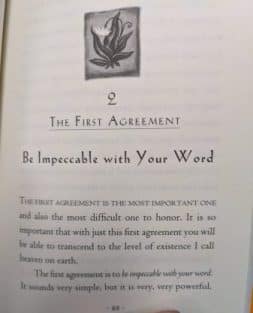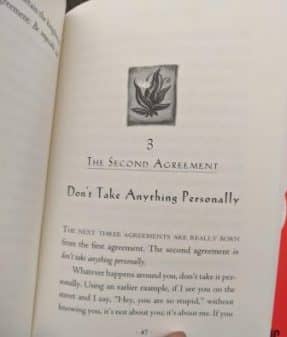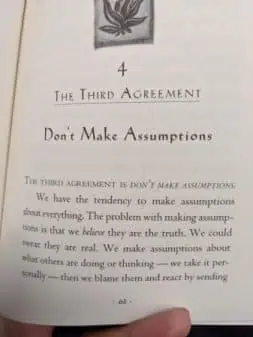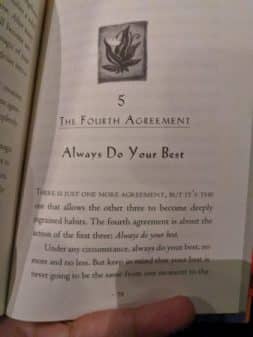Collected Book Quotes: Don Miguel Ruiz and Janet Mills’ The Four Agreements
In this post, you’ll find quotes pulled from Don Miguel Ruiz and Janet Mills’ book “The Four Agreements,” including page numbers.
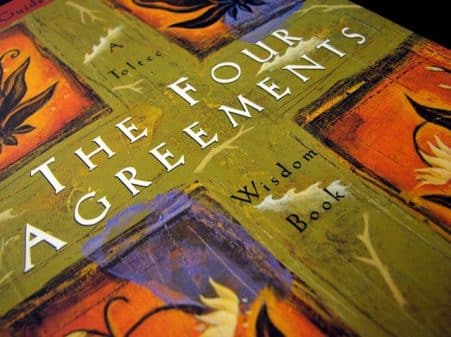
Spoiler Alert: This summary and review contains spoilers.
Additionally, some images and text may include affiliate links, meaning we may earn a commission or receive products if you make a purchase.
In this post, you’ll find quotes pulled from Don Miguel Ruiz and Janet Mills’ book “The Four Agreements,” including page numbers.
[…] the domestication of humans. […] through this domestication we learn hot to live and how to dream. In human domestication, the information from the outside dream is conveyed to the inside dream, creating our whole belief system.
— Page 6
Children are domesticated the same way that we domesticate a dog, a cat, or any other animal. In order to teach a dog we punish the dog and we give it rewards. We train our children whom we love so much the same way that we train any domesticated animal: with a system of punishment and reward.
— Page 6
[…] we need a great deal of courage to challenge our own beliefs. Because even if we know we didn’t choose all these beliefs, it is also true that we agreed to all of them.
— Page 11
True justice is paying only once for each mistake. True injustice is paying more than once for each mistake.
— Page 12
If we compare the dream of human society with the description of hell that religions all around the world have promulgated, we find they are exactly the same. Religions say that hell is a place of punishment, a place of fear, pain, and suffering, a place where the fire burns you. Fire is generated by emotions that come from fear. Whenever we feel the emotions of anger, jealousy, envy, or hate, we experience a fire burning within us. We are living in a dream of hell.
— Page 14
No human can condemn another to hell because we are already there. Others can put us into a deeper hell, true. But only if we allow this to happen.
— Page 14
Just being ourselves is the biggest fear of humans. We have learned to live our lives trying to satisfy other people’s demands. We have learned to live by other people’s points of view because of the fear of not being accepted and of not being good enough for someone else.
— Page 17
In your whole life nobody has ever abused you more than you have abused yourself. And the limit of your self-abuse is exactly the limit that you will tolerate from someone else.
— Page 20
The human mind is like a fertile ground when seeds are continually being planted. The seeds are opinions, ideas, and concepts. You plant a seed, a thought, and it grows. […] The only problem is that too often it is fertile for the seeds of fear.
— Page 28
One word is like a spell, and humans use the word like black magicians, thoughtlessly putting spells on each other.
— Page 28
Personal importance, or taking things personally, is the maximum expression of selfishness because we make the assumption that everything is about “me.” […] Nothing other people do is because of you. It is because of themselves. […] When we take something personally, we make the assumption that they know what is in our world, and we try to impose our world on their world.
— Page 48
Whatever you think, whatever you feel, I know is your problem and not my problem. It is the way you see the world. It is nothing personal, because you are dealing with yourself, not with me.
— Page 51
When we really see other people as they are without taking it personally, we can never be hurt by what they say or do. Even if others lie to you, it is okay. They are lying to you because they are afraid.
— Page 57
Because we are afraid to ask for clarification, we make assumptions, and believe we are right about the assumptions then we defend our assumptions and try to make someone else wrong.
— Page 64
It is not important if the answer is correct; just the answer itself makes us feel safe. This is why we make assumptions.
— Page 68
If you don’t understand, ask. Have the courage to ask questions until you are clear as you can be, and even then do not assume you know all there is to know about a given situation. […] Also, find your voice to ask for what you want. Everybody has the right to tell you no or yes, but you always have the right to ask. Likewise, everybody has the right to ask you, and you have the right to say yes or no.
— Page 72
Regardless of the quality, keep doing your best — no more and no less than your best. If you try too hard to do more than your best, you will spend more energy than is needed and in the end your best will not be enough. When you overdo, you deplete your body and go against yourself, and it will take you longer to accomplish your goal. But if you do less than your best, you subject yourself to frustrations, self-judgment, guilt, and regrets.
— Page 76 to 77
Doing your best is taking the action because you love it, not because you’re expecting a reward.
— Page 79
There is no need to blame your parents or anyone who abused you in your life, including yourself. But it is time to stop the abuse. It is time to free yourself of the tyranny of the Judge by changing the foundation of your own agreements. It is time to be free from the role of the Victim.
— Page 96
Victims repress because they are afraid to show the emotions, afraid to say what they want to say. To refrain is not the same thing as repression. To refrain is to hold the emotions and to express them in the right moment, not before, not later.
— Page 117

